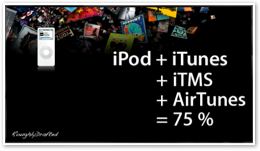


What's an Apple basher to write about when the company dishes out multiple new products at once? Does one tear into Apple TV as ‘not being able to play DVD discs,’ as did Fortune's ‘Grouchy Geek,’ and merely imply that the iPhone will be just as disappointing?
Or does one go right to the jugular by attacking the iPhone itself, and then suggest that if Apple's iPhone--which has captured far more attention among consumers than any phone that's actually on sale--is belabored with troubles, then everything else the company is doing will similarly fail?

That was the tack chosen by Lance Davis, writing for the Register. He recently observed what I had written about half a year ago: that Steve Jobs' plan to grab “just 1%” of the mobile market with the iPhone is an outrageously ambitious goal.
Steve Jobs and the Insane 1% Mobile Plan.
Back in January I wrote, “Steve Jobs announced that Apple planned to take just 1% of the billion unit mobile phone market, and charmed his audience into thinking that this would be relatively easy. What he failed to mention is that the vast majority of the mobile market--around 95%--is made up of cheap units euphemistically described as ‘feature phones.’”
“Apple may be shooting for 1% of the ‘mobile market,’ but it really intends to capture closer to 15% of the smartphone market--more than Palm, RIM, and Windows Mobile combined--in its first year.”
“Does Apple plan to steal sales from existing smartphone makers, or does it have in mind upgrading users of basic phones to the new, more powerful iPhone? It seems pretty clear the company would have to do a lot of both to meet that aggressive target.”
RoughlyDrafted vs the Register.
Of course, while stating the same thing, we both came to different conclusions. I presented Apple's 10 million unit goal as a bold challenge, while Davis presents it to the Register’s readers as an laughable impossibility.
He even says that citing such a percentage goal is “not a useful benchmark.” Hmm. Perhaps that makes some sort of sense in the Queen's English.
Davis says that even the popular RIM Blackberry hasn't reached the 10 million figure yet. So what has in the multiple millions? Oh yeah, the iPod! It has sold over 100 million units, with 70 million in the last year and a half.
Davis doesn't concern his Register readers with that relevant bit of information, but instead makes a comparison to cars. No, not car makers with more than 2% of the entire world's market share of auto production, but the hand-built, ultra exotic McLaren. “It's a bit like saying the world car market is 18 million cars so McLaren can sell 180,000 because that's only one per cent. In practice, it sold 28 cars last year.” 





Apples, McLarens, and Oranges, Oh My.
Ah yes, McLaren, maker of one of the fastest street legal cars in production. Also a British company, meaning they demand a team of mechanics to keep them running. Even Steve Jobs would have some trouble obtaining one were he so inclined to buy an expensive British car. Does that mean only 28 iPhones will ever be sold?
Of course, McLaren has never set goals to sell vehicles in volume, and certainly not millions of cars. The company doesn't make common cars, they make outrageously sexy fast cars that hit 100 mph in six seconds. They also cost outrageous sums of money. A McLaren really costs whatever price you want it to be, because the company only churns out a few each year.
What about the iPhone? It's expensive too, right? An iPhone is at least $500, which is apparently a lot of money to trazillionaire Steve Ballmer. In really however, the iPhone with the service needed to operate it only costs a 20% premium--or $15/month over two years--over the highly discounted Motorola Q, which does nothing interesting at all, even though Ballmer likes to pretend that it’s not a complete piece of crap.
If I could buy a McLaren F1 for just 20% more than a Pontiac, I'm sure I would not be alone in springing for the sexiest car on the road. Now imagine if Hon Hai and Quanta could churn out millions of McLarens, rather than their being slowly tooled together by Englishmen struggling with tools.
Who wouldn't be driving such a fast sexy car? Would there be any problem in selling 180,000 McLarens if price and production were no issue? Perhaps not.
Devastating Leaps of Registerine Logic.
Davis then jumps into a different pile of shoddy math. “It would be surprising if iPhone accounted for one per cent of sales just within the one network which has been announced – AT&T.” Why would this be surprising? Because AT&T has already signed up a million people on its iPhone mailing list of interested buyers?
He continues, “The [AT&T] network has 56.3 million subscribers but not all of them will get a new phone each year. Even so, half a million smartphones is a huge success.”
Actually statistics show that of all mobile users, about a third buy new phones every year. In 2005, IDC reported 2 billion mobile users, but 825 million new phones sold. In 2006, around 930 million new phones sold. Clearly, people ditch their old phones pretty rapidly to get something new. Most service contracts even allow users to buy a new subsidized phone every couple years.
To suggest that AT&T will only have a tiny fraction of users interested in the iPhone is absurd. Who wouldn't pay a 20% premium to buy a real phone when they're already paying through the nose for service on their existing piece of crap?  When Enderle and Thurrott say this kind of stuff, they are at least getting paid for it. What’s the Register’s motivation for spewing asinine ignorance?
When Enderle and Thurrott say this kind of stuff, they are at least getting paid for it. What’s the Register’s motivation for spewing asinine ignorance?
 When Enderle and Thurrott say this kind of stuff, they are at least getting paid for it. What’s the Register’s motivation for spewing asinine ignorance?
When Enderle and Thurrott say this kind of stuff, they are at least getting paid for it. What’s the Register’s motivation for spewing asinine ignorance?Think of the Children.
Remember too that 100 million new phones are sold to entirely new subscribers every year, and that specifically smartphones--which purport to do something other than just place calls--are growing by 45% every year.
If you ignore the jackasses at ABI that are being paid by Microsoft to tell you that the iPhone “isn't a smartphone” because it doesn't enrich Microsoft, you have to jump to the obvious conclusion that the iPhone is exactly what a lot of buyers are interested in already, even before have ever seen it.
People want a phone that works and is smart. No amount of FUD spewing from the Register and friends will temper that demand. We can argue about whether the iPhone will be a bigger hit with business users or kids, but lets stop with the “nobody wants a decent phone” meme. It was ridiculous six months ago.
Merrill Lynch says Apple is set to sell more iPhones than the company itself is forecasting. It just released a report stating expectations of 4 million iPhones being sold in 2007, and 12 million more by the end of 2008, suggesting that Apple could overshoot its goal by 60%.
That’s a far cry from the LOLcats at the Register and CNET, who think its hilarious to repeat IM N UR FACE, TRASHN UR iPHONZ!!
Davis: I Was on Holiday When The iPhone Was Released.
The Register also seems to think that Apple needs to tie the iPhone into every network provider on the planet. Davis says, “there are over 200 significant networks in the world and the networks buy 80 per cent of the world's handsets.” Apple has only signed up AT&T in the US, and Rogers in Canada. Is this a problem?
[Update: reader Politico reports [Apple] has not signed on with Rogers although everyone assumes that is their Canadian partner. Rogers announced and later withdrew their announcement of the exclusive carrier of iPhone in Canada. An executive VP of Apple at a dealer meeting a couple of months ago added that they "…are not talking to anyone else …". The VP meant worldwide. They want the rollout to go as smoothly as possible before they expand their geographic offerings.]
Consider the iPod. How many outlets carried it at its release? I believe it was just the Apple Store. How many outlets are interested in carrying the various models of the iPod now that its a household name that everyone asks for? Is it likely that Apple has learned something about marketing consumer electronics while keeping the iPod hot and fresh over the last seven years and earning billions? 

Where are the iPod competitors? You know, the steady volley of iPod-killers that marched out of the gates of Sony, Creative, Toshiba, and even Microsoft, only to go absolutely nowhere in challenging the iPod. Are those companies going to dish out a iPhone killer, and why would they be able to after failing to match the simple iPod?
iPod :: iPhone.
Now think of the iPhone. Nobody knew what the iPod was before it was released, but the iPhone was fantasized about for well over a year before it was ever announced. In the last six months, the iPhone has become talk show fodder and the focus of several TV sketch comedy skits. People know to ask for the iPhone because well over 100 million have an iPod and like it.
Apple is even forbidding AT&T from selling the iPhone through other affiliated outlets, including Radio Shack, a Cingular/AT&T licensee. Apple wants to sell the iPhone exclusively in its own retail stores and in AT&T's own retail outlets. If that's the case, why is the Register whining that Apple lacks outlets and providers?
That's what Apple wants to be the case! Perhaps Apple has a better grip on what it needs to do as a company since it actually sells billions more kit than the Register every quarter. Hey Davis: Apple doesn't tell you how to sell mugs and T-shirts.
Perhaps the Register should bugger off of Apple's financial predictions, since its coverage of iTunes and the iPod have not been on target to say the least. Where was the retraction over calling iTunes a collapsing failure last fall? Different writer, but the same message.
The Service Providers Want Apple.
Why does Apple need to grovel to every service provider in the world to carry its phone? Davis seems to think Apple will have to struggle with hundreds of service providers to implement back end features and billing. The funny thing is: Apple doesn't at all.
By choosing a single provider in each major market, Apple can offer a tightly integrated service that is dramatically better than the alternative offered by other phone makers, which all currently live at the whim of service providers. Motorola, Nokia and other phone makers have had a difficult time pushing the state of the art because of the service providers. Apple's disruption of the market will be good for everyone.
Mobile service providers have been pushing users to free, low feature phones to get them to sign up with long term service contracts. Now that the majority of the market has a phone, the next push is to get all those users to upgrade to phones that make use of data networks and other premium services.
The existing, highly subsidized market they created is strangling that possibility though, because phone makers are forced to serve the needs of service providers, not end users. Microsoft played into the same trap with Windows Mobile, which just injects a layer of licensing into the same tawdry phones.
Whenever the market plays to middlemen instead of end consumers, the result is poor quality and low innovation. Apple is pitching to consumers directly with the iPhone.
The End of the Baby Internet.
So far, the phone companies have been pushing crapware like Verizon's BREW, overpriced ringtones, and billing extra for worthless services. Consumers want things that actually solve their problems.
Apple's phone uniquely raises the bar in terms of the real features it offers. It's not the “baby Internet,” as Jobs like to call it, but a real web browser, real email, and real web service clients like the new Google Maps.
That's what consumers want, but it’s also what service providers want: a way to sell data services that consumers will actually use. If AT&T can sell iPhones, it can sell unlimited data plans. Verizon and Sprint won't be able to match that, and will lose their prime customers. Every customer a provider loses is hundreds of dollars in lost opportunity costs and marketing expenses to try to find new ones.
That's the obvious reason why AT&T is talking up the iPhone as the device that will reinvent the company and help it transition from the Cingular brand to the new AT&T. That's why AT&T is sharing service revenues with Apple to get its exclusive carrier coverage, and why it’s working to implement changes to its servers to accommodate the iPhone's features.

Doesn’t everyone know that?
Phones Hard!
Davis then rambles into Palm CEO territory saying, “remember, the mobile industry is one where some of the biggest companies in the world have tried and failed: Siemens, Philips, Fujitsu. None of them have creditable market shares. Even IBM put a toe in the water in the late nineties and then stayed away.”
Yes, all juggernauts in consumer electronics! I bet IBM would make a great mobile phone. They once managed to resell the Palm Pilot by painting it black. Clearly if a mainframe and services company like IBM can't make a successful consumer mobile, then the maker of the iPod and iTunes has no chance! Or perhaps not.
Why didn't Davis put a toe in the waters of reality by mentioning that Apple is already a consumer electronics powerhouse that has embarrassed Microsoft and its industry 'partners' including Wal-Mart, Amazon, Napster, and MTV Urge?
Perhaps injecting some reality in his article would make the rest of his comments seem silly.
Why the iPhone Will Disappoint.
Speaking as if his prognostications have already come to pass, Davis says, “while iPhone sales volumes disappoint everyone, the device will not.” Actually, I think the sales volumes will only be disappointing if it gets too hard to obtain an iPhone. I have not been able to buy a Wii in six months of trying, and I've about given up. I sure hope it will be easier to get an iPhone, because I really want to replace my infuriating Treo.
Apple had no problem selling the iPod Shuffle with no display or the video iPod with its tiny 2" screen in large volumes. If anything, the iPhone will disappoint not in terms of sales, but in terms of its fantastic features. Why?
Because when a bad product gets thrown into the market, people make excuses for it. Consider the Zune. It's a turd through and through, but it has a pestilent fan base in the double digits who pass off its problems as inconsequential and hope for a future nirvana of a fabled firmware update prophesied to turn it into a worthwhile device. Hope abounds when none is warranted, just ask the early adopters of WinCE devices--if you can find one.
The Disappointment of Perfection.
Conversely however, when an amazing new jump in technology occurs, it suddenly sparks the imaginations of the world in new ways. People jump on what-if scenarios and imagine 24th century features that are impractical and silly. When their ideas aren't immediately delivered, they complain and bash.
The original Macintosh sparked that kind of wonder but was immediately attacked over its limited resources and early adopter price. Mac OS X was lauded as a great new operating system, only to be criticized that its open source core wasn't “open enough,” or that its advanced compositing graphics engine--introduced a half decade ahead of Vista’s--wasn't faster in 2001 than Vista's would be in 2007. Fair? No. Reality? Yes.
Waa, the iPod doesn't play the radio! I can't buy songs whilst walking down the street! There's no way to use P2P networks to implement buzzword savvy mesh downloads! This mobile phone does not make me lose weight! It should offer WiMax because I read about the technology somewhere! And so on.
Out Of Control Expectations.
The world has very different expectations from Microsoft and Apple. If Microsoft can scrape something together and call it a product vision, we applaud and hand them a silver star, knowing that it probably won't ever get released, and that even if it does, nobody will buy it apart from the minority of fans who adore the company's ability to entertain them with mediocrity.
When Apple releases an actual product, the critics come out of the woodwork to explain why it won't sell, why it won't matter, and why everyone should just move along because there's really nothing to see here. Inevitably, Apple's introductions are welcomed in the market place by actual consumers, who can't get enough of products that work well without a struggle and actually solve real problems.
Nobody has spent any significant amount of time explaining how tragically bad Windows Mobile is--apart from me of course. And until the Zune pulled out of the gate in flames, the tech world was abuzz about how it could unleash some new iPod killing capacity that had been lying dormant in the PlaysForSure world for years.
Whee, synergy of community! The Social! I can't wait to buy all my PlaysForSure music again just so I can share it in a temporary fashion via WiFi because that makes sense!
The Embarrassment of Microsoft.
Microsoft's regular unveilings of technology visions incite some polite excitement among nerds and people who make their living from gushing over the company's talk, but do little to generate excitement among consumers.
Recall that Microsoft has lost billions across its entire line of consumer electronics initiatives over the last five years, and the majority of Microsoft’s introductions never even made it out of the gate. Mira? Tablets? UMPC?
But who cares about money and profits? For the true technology enthusiast, what matters is not who makes the most money, but who advances the state of the art. By that measure, Microsoft has failed even within its grotesquely profitable Windows and Office monopolies. Why is the sole vendor of PC operating systems struggling to match the advances of Apple, which has recently only owned about 3% of the world's computer sales?
Where has Microsoft innovated in consumer facing technology? By delivering the Macintosh ten years later with Windows 95? In delivering portions of Mac OS X nearly a decade late with Windows Vista? In shipping a gamer PC in a big black box and losing billions of dollars to achieve a tie for a distant runner up position? In copying the iPod by re-releasing Toshiba's Gigabeat? In its failed mobile phone, DRM, and SPOT watch efforts?
Will Microsoft ever release interesting technology? The next article scratches the surface of Microsoft's future prospects.
Like reading RoughlyDrafted? Share articles with your friends, link from your blog, and subscribe to my podcast!
Did I miss any details?
Next Articles:
This Series

Haloscan Q107
The Register's Latest iPhone Panic by Lance Davis
Sunday, June 3, 2007

Ad












 Bookmark on Del.icio.us
Bookmark on Del.icio.us Discuss on Reddit
Discuss on Reddit Critically review on NewsTrust
Critically review on NewsTrust Forward to Friends
Forward to Friends
 Get RSS Feed
Get RSS Feed Download RSS Widget
Download RSS Widget





